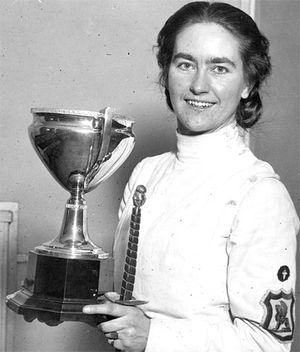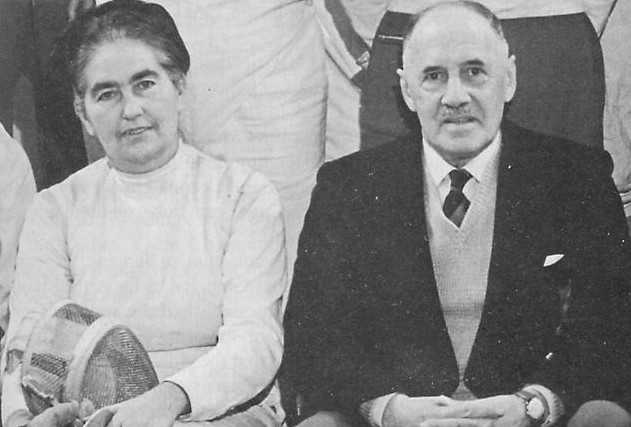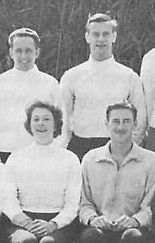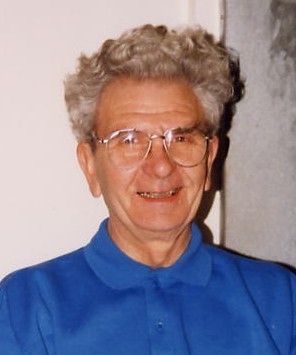|
|
|
|
The Merseyside Open is one of the oldest open fencing competitions in the country, having been started in 1938 as the Liverpool Open Foil Tournament by Dr Dorothy Knowles, a lecturer at Liverpool University and a prominent local fencer. The tournament was run by the University and Dr Knowles managed to persuade Richard Harold Armstrong, then Pro-Chancellor, and Sir Frederick Marquis (later Lord Woolton), the University Treasurer, to donate trophies for the initial men's and women's foil championships. These fine solid silver cups are still presented to the winners of the foil events, but unfortunately only briefly, as they have to be returned to safe deposit for insurance reasons.
|

Dorothy Knowles with
the Lord Woolton Cup
in 1938
|
Dr Knowles organised the tournament for many years, more than twenty of them with the assistance of local fencing master Professor Wladimir Zaaloff.
Zaaloff was a local celebrity, a refugee from the Tsarist Diplomatic Service since the Russian Revolution who taught fencing at the Universities of Liverpool and Manchester besides running his own fencing salle and a successful bridge school.
Dr Knowles also continued to compete at the tournament and achieved the remarkable record of winning the women's foil title ten times in four different decades between 1938 and 1962, and even reached the final in 1966 at the age of 60.
|

Dorothy Knowles and Prof Zaaloff
|
Upon her retirement, however, the University Fencing Club had to turn to the wider local fencing community to provide the continuity that the tournament needed to secure its future. Beryl Banks joined the organising committee in 1960 and for many years ran the event with Mike Bishop, who had joined the University as an undergraduate in 1967 and then stayed on in Liverpool as a teacher.
|

Arthur Banks
(top right) and
Beryl Banks
(bottom left)
in 1963 |
The tournament continued to grow in importance and the decision was taken, at the University's suggestion, that it should become independent of the University.
The organising committee was also enlarged to reflect the wider responsibilities involved in running a modern fencing tournament. Arthur Banks became chairman in 1982 and Beryl Banks the honorary secretary/treasurer, positions that they were to hold until their deaths within six months of each other in 1994/95.
Don Poole took over from Arthur as chairman until handing over the reins to Steve Evison in 2000 and today the organising committee consists of 11 members with wide-ranging experience in competitive fencing, coaching and running competitions at various levels.
|

Don Poole

Steve Evison |
The history of the tournament has been one of growth and change. As the number of entries grew, the competition had to move from the old University gym in Harding Street to the new gym in Mount Pleasant in 1967. Two years later the number of events expanded when Arthur Banks presented a trophy for women's team foil, which was competed for until 1983.
In 1978 the tournament was associated with the Liverpool Youth Festival and received sponsorship from the city, which enabled it to invite several top competitors and national referees. Lloyds Bank presented trophies to introduce sabre as a second weapon and the tournament recognised this with a change of name to the Liverpool Open Fencing Tournament.
The following year, men's epee was introduced, for which Mike Bishop presented a trophy, this still being some years before women's epee became a recognised weapon. In 1980, with entries exceeding 100 fencers, the tournament relocated once more, this time to the Kirkby Sports Centre. The move outside the Liverpool boundary prompted a further change of name to the Merseyside Open Fencing Tournament, often abbreviated to MOFT.
The tournament continued to develop and in 1988 women's epee was finally introduced with the presentation of the KPMG Rose Bowl by the then sponsors.
In 1997, the organisers were approached to stage the National Women's Cadet Foil Championship on the Sunday of the tournament and this proved to be a great success for both competitions, attracting many top young fencers to the MOFT women's foil event on the Saturday.
Administrative problems led to a move to the Bebington Oval Sports Centre on the Wirral for the 1999 and 2000 events, but MOFT2001 saw a return to Liverpool at the new sports centre at Liverpool College. The final piece in the jigsaw was also added, with the introduction of women's sabre as a separate event in its own right after 11 years of mixed sabre.
By 2009, however, the tournament had outgrown Liverpool College and, with entries approaching 400 fencers, it made the short move to the new Greenbank Sports Academy site, which offered a larger sports hall and excellent ancillary facilities.
The tournament has been one of the innovators in the computerisation of fencing since the days of Arthur Banks. His programs pre-dated Engarde and, although the sport's standard was eventually adopted at Merseyside, some of his programs handling matters outside the main processing of results continued to be used for many years. The tournament was also among the first to have its own website and was one of the pioneers of online entry.
The tournament was also among the first to investigate sponsorship as a means of meeting the rising costs of running an open competition. John Wallwork Limited sponsored the event for seven years from 1984 and were joined in 1987 by KPMG Peat Marwick, who later became sole sponsors. In 1995 they were succeeded by Pannell Kerr Forster who in turn were followed by Tilney Investment Management for one year in 1999. A new approach was taken for the 2000 event, which was sponsored by a number of smaller organisations. In 2006, however, Leon Paul took over as sole sponsors and the tournament now looks forward to a long association with one of the world's leading suppliers of fencing equipment. The support of all these companies has been much appreciated over the years, allowing the tournament to improve its presentation with metallic pistes, the services of FIE referees and a high standard of prizes, which continue to add to the MOFT experience.
Obituaries of Dr Dorothy Knowles (1906-2010)
The Guardian
The Independent
|
|
| Return to top |
|